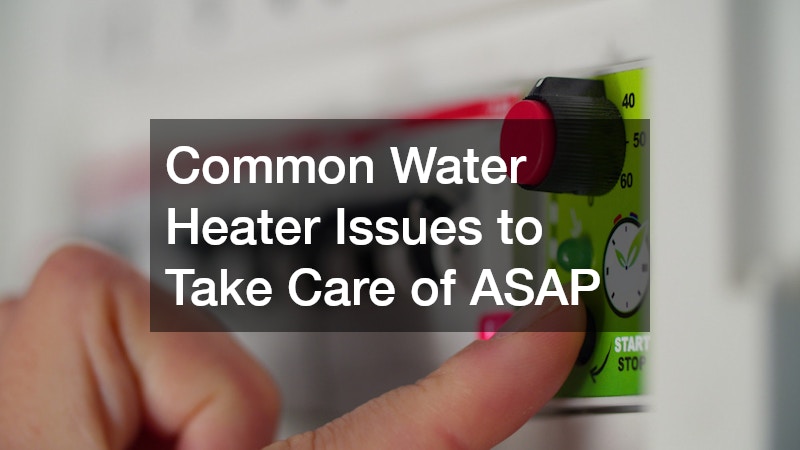Cold showers, rising energy bills, and subtle leaks are all signals that your water heater needs attention now, not later. Small problems tend to escalate quickly because heat, pressure, and minerals work together inside the tank every day. A fast response protects your home from water damage, guards against scalding or carbon monoxide risks, and restores comfort. If you are already seeing early warning signs, schedule professional water heater services before a quick fix turns into a major repair.
No Hot Water or Wild Temperature Swings
Total loss of hot water often points to a failed heating element on electric units or a gas supply or ignition fault on gas models. Temperature swings can also come from a failing thermostat, a broken dip tube that mixes cold inlet water with hot supply, or mineral buildup that insulates the heat source from the water you use.
These issues waste energy and frustrate daily routines. Timely water heater services include diagnostic testing, component replacement, and recalibration so showers, dishwashing, and laundry return to normal.
Leaks, Drips, and Pressure Problems
Any moisture around the tank deserves an immediate look. Common sources include loose fittings, a weakened drain valve, or a compromised temperature and pressure (T&P) relief valve. Excess pressure from high inlet pressures or thermal expansion can force water from relief devices and shorten tank life. Left alone, even slow drips can rot subfloors and encourage mold. A professional can test system pressure, verify expansion tank performance, and confirm that the T&P valve opens and reseats properly for safe operation.
Discolored, Rusty, or Smelly Hot Water
Brown or rusty hot water suggests internal corrosion, often because the sacrificial anode rod is exhausted. Rotten-egg odors indicate hydrogen sulfide produced by bacteria that thrive in warm tanks, especially when water sits. Sediment can also discolor water as minerals break loose during heating cycles. Proper water heater services address these with anode inspection and replacement, tank flushing, and, in some cases, temperature adjustments or disinfection protocols. Clear, odor-free water protects fixtures, laundry, and your peace of mind.
Strange Noises and Heavy Sediment Buildup
Popping, rumbling, or kettling sounds come from steam bubbles fighting through a layer of hardened mineral sediment at the bottom of the tank. That layer forces the burner or element to work longer and hotter, raising utility costs and stressing metal. If sediment gets thick, it can clog drain valves and reduce usable capacity. A controlled flush performed by a technician restores efficiency and reduces noise. In areas with hard water, periodic maintenance prevents sediment from becoming a recurring headache.
Pilot Light, Ignition, and Electrical Faults
Gas water heaters rely on a steady flame and precise controls. A stubborn pilot, dirty flame sensor, failed igniter, or blocked vent can cause intermittent shutdowns or unsafe combustion. Electric units can trip breakers or show erratic heating when elements short or thermostats fail. These are not issues to troubleshoot casually, because fuel, heat, and confined spaces raise the stakes. Professional water heater services include safe gas shutoff procedures, combustion checks, electrical testing, and code-compliant repairs that restore reliable operation.
Not Enough Hot Water, or Too Much
Running out of hot water sooner than you used to suggests capacity and demand are out of sync, or that performance has declined. Families grow, appliances change, and schedules stack showers back to back, revealing limits the system once handled. Thermostats set too high can create scald risks, while settings too low may invite bacteria in storage tanks. A technician can verify thermostat accuracy, assess recovery rate, and discuss options such as mixing valves, recirculation, or a right-sized replacement that fits current usage.
Age, Efficiency, and Replacement Timing
Most storage tank heaters last about eight to twelve years in typical conditions, and end-of-life failures often come with little warning. Rising energy bills, frequent repairs, and visible rust around seams signal that you are near the finish line. Upgrading to a heat pump water heater or a properly sized tankless unit can improve efficiency and free up space when the timing is right. A measured plan avoids emergency installations and gives you time to compare warranties, fuel types, and utility rebates.
Safety First and When to Call a Pro
Water heaters concentrate heat and pressure, so safety checks are not optional. Verify that the T&P discharge line is unobstructed, keep combustible items away from gas units, and test carbon monoxide alarms near fuel-burning equipment. If you smell gas, shut the supply at the valve and step outside before calling for help. When leaks, odors, or ignition issues appear, choose qualified water heater services that include a written diagnostic report, clear pricing, and a maintenance schedule. Fast action keeps your system dependable and your home protected.
